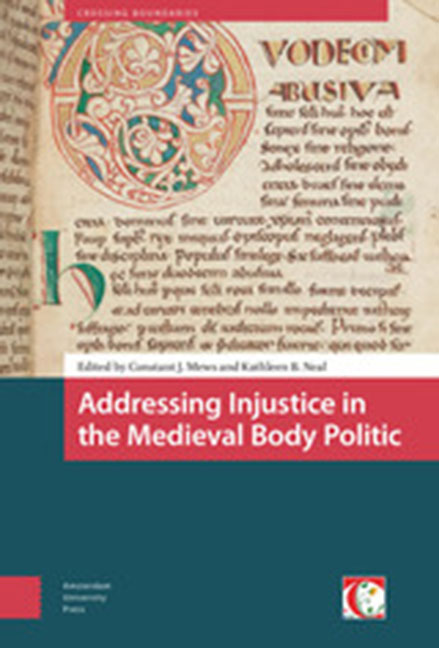Book contents
- Frontmatter
- Contents
- Acknowledgements
- Abbreviations
- Note on References
- List of Tables and Illustrations
- Introduction: Justice and its Abuse in the Medieval Body Politic
- 1 The De XII abusiuis saeculi: Contexts and Textual Traditions
- 2 The Irish Background to the De XII abusiuis saeculi
- 3 ‘Each in the Calling to Which They are Called’: Images of Authority in the De XII abusiuis saeculi
- 4 Transforming Irish Traditions: De XII abusiuis saeculi and Justice in the Frankish World, c. 750–1050
- 5 The Unjust King and the Negligent Bishop: Addressing Injustice in Eleventh and Twelfth-Century England and Germany
- 6 Reflecting on Abuses in Religious Life: From The Twelve Abuses of the Cloister to The Cloister of the Soul
- 7 Preaching the Body Politic: John of Wales and Franciscan Political Thought in the Late Thirteenth Century
- 8 Justice and Its Abuses in the Speculum justiciariorum
- 9 Addressing Abuses and Injustice in the Court of Philip the Fair: The De informatione principum of Durand of Champagne
- 10 ‘Perfect Justice Weighs Everything on a Balanced Scale’: Italian Friars on Equity, the Common Good, and the Commune c. 1270–c. 1310
- 11 Some Late Franciscan Rewritings of the Twelve Abuses
- Appendix: On the Twelve Abuses of the Age A Translation
- Bibliography
- Index of Biblical References
- Index of Manuscripts
- General Index
8 - Justice and Its Abuses in the Speculum justiciariorum
Published online by Cambridge University Press: 14 February 2024
- Frontmatter
- Contents
- Acknowledgements
- Abbreviations
- Note on References
- List of Tables and Illustrations
- Introduction: Justice and its Abuse in the Medieval Body Politic
- 1 The De XII abusiuis saeculi: Contexts and Textual Traditions
- 2 The Irish Background to the De XII abusiuis saeculi
- 3 ‘Each in the Calling to Which They are Called’: Images of Authority in the De XII abusiuis saeculi
- 4 Transforming Irish Traditions: De XII abusiuis saeculi and Justice in the Frankish World, c. 750–1050
- 5 The Unjust King and the Negligent Bishop: Addressing Injustice in Eleventh and Twelfth-Century England and Germany
- 6 Reflecting on Abuses in Religious Life: From The Twelve Abuses of the Cloister to The Cloister of the Soul
- 7 Preaching the Body Politic: John of Wales and Franciscan Political Thought in the Late Thirteenth Century
- 8 Justice and Its Abuses in the Speculum justiciariorum
- 9 Addressing Abuses and Injustice in the Court of Philip the Fair: The De informatione principum of Durand of Champagne
- 10 ‘Perfect Justice Weighs Everything on a Balanced Scale’: Italian Friars on Equity, the Common Good, and the Commune c. 1270–c. 1310
- 11 Some Late Franciscan Rewritings of the Twelve Abuses
- Appendix: On the Twelve Abuses of the Age A Translation
- Bibliography
- Index of Biblical References
- Index of Manuscripts
- General Index
Summary
Abstract
This chapter explores the remarkable explosion in discussion of abusion in an Anglo-Norman text of the late thirteenth century, the Speculum justiciariorum (The Mirror of Justices). This work can be described as a hybrid, a deconstruction and recomposition of medieval English legal theory and practice through the filter of speculum principum conventions. It examines abusion in terms of three rough categories: political (against the crown and royal court), judicial (relating to misbehaviour by judges in the service of the king), and legal (relating to statutes that violate the customary laws of the realm). This work, seemingly addressed to Edward I, offers a sophisticated and scathing review of the administration of justice in the realm, drawing on royal precedent and scripture.
Keywords: Abuses, Speculum justiciariorum, kingship, justice, judges, law.
As we know from the other chapters contained in this volume, the De XII abusiuis saeculi and its concentration on the term ‘abuse’ had wide dissemination in the medieval world well beyond the period of its initial composition. The present chapter highlights one such example of this pervasive interest in abuse located in the text of a unique (to the point of exceedingly odd) anonymous Anglo-Norman pseudo-legal treatise entitled the Speculum justiciariorum (usually translated as The Mirror of Justices). By my count, the word abusion shows up 175 times in this volume. Indeed, its fifth and final book is called ‘De Abusions’. Modern scholars—even those who have deemed it worthy of study—commonly treat the Speculum justiciariorum as an idiosyncratic, if not sui generis, book; the adjective frequently employed to describe it is ‘curious’. Although it evidently dates to between 1285 and 1289, its authorship remains in dispute and may never be established with confidence. One aspect of the Speculum justiciariorum that renders it so problematic is its defiance of clear classification. On the surface, it appears to be a version of the common law compendium genre typical of medieval England, comparable to Glanville, ‘Bracton’ and Fleta. Its author clearly knew and relied upon the Bractonian De legibus et consuetudinibus Angliae. As I have argued elsewhere, however, I believe that we ought to count it as a variant of the speculum principum genera. Although the Speculum justiciariorum is no conventional ‘mirror’, it can reasonably be described as a hybrid, a deconstruction and recomposition of medieval English legal theory and practice through the filter of speculum principum conventions.
- Type
- Chapter
- Information
- Addressing Injustice in the Medieval Body Politic , pp. 233 - 248Publisher: Amsterdam University PressPrint publication year: 2023



